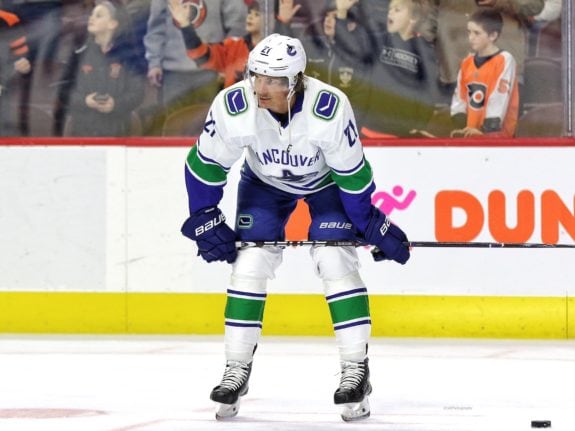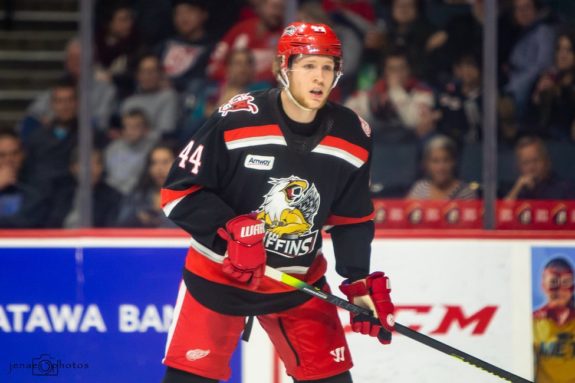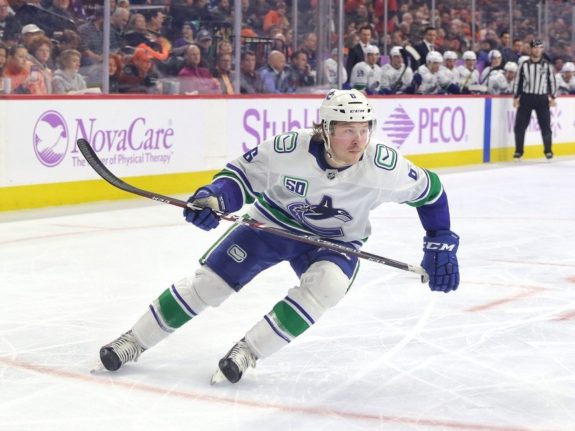Let’s start this by stating the obvious: the news of Brock Boeser’s availability is nothing more than a rumor right now – a rumor that Vancouver Canucks general manager Jim Benning promptly denied. However, where there’s smoke, there’s usually fire. And if this fire is truly burning, it would interest the Detroit Red Wings to investigate.
Related: Revisiting Jim Benning’s Drafts – 2014
It’s not every day that a 23-year-old winger with a points-per-game (P/G) average of 0.82 finds his name in the rumor mill. He was the 23rd selection of the 2015 draft and he has been a consistent part of the Canucks’ offense since 2017. So why would the Canucks be interested in moving him?
The answer is money. The Canucks project to have a little over $17 million in cap space once the season ends and they’ve got some big contracts discussions to have in the near future. Their starting goalie, Jacob Markstrom, could test free agency. Tyler Toffoli, one of their trade deadline acquisitions, needs a new deal. This offseason is also when they can begin discussions with star center Elias Pettersson on an extension.
Cap Relief
On the other hand, the Red Wings look to have over $35 million in cap space this offseason. Yes, they’ve got some important contracts to work out themselves but they should have plenty of room left after they get those taken care of. With this financial opportunity, the Red Wings should leap at the chance to collect a prime, young asset in exchange for taking on some financial burdens.
Boeser’s contract has two more seasons remaining at a cap hit of $5.875 million. As it currently stands, that would make him the second-highest-paid player on the Red Wings’ roster behind only Dylan Larkin. But the real lure here wouldn’t be taking Boeser off the Canucks’ hands – it would be taking Loui Eriksson off their hands.

Of all the contracts on the Canucks’ books, none offend more than Loui Eriksson’s. Signed for two more years at a cap hit of $6 million, the (almost) 35-year-old hasn’t scored more than 29 points during his stay in Vancouver. Taking on his deal would actively decrease the value of Boeser, making it easier for the Red Wings to field a worthwhile offer.
The Offer
On his own, Boeser could probably yield a first-round pick. He is already a proven offensive contributor at the NHL level, and at just 23-years-old, he still has time to develop his game. Given their lack of a first-round pick this season, this may very well be the route the Canucks pursue if they opt to deal him.
Coupled with Eriksson, the return goes from a top-tier asset to a mid-tier one. To add some context to this line of thinking, in 2016 the Carolina Hurricanes acquired young winger Teuvo Teravainen and Bryan Bickell’s bloated contract from the Chicago Blackhawks in exchange for a second and third-round pick.
Related: Detroit Red Wings’ 50-Goal Club
Like the Blackhawks, the Canucks would already be acquiring a boat-load of cap space, so anything else would be gravy. Luckily for the Red Wings, they are overflowing with mid-tier assets.
One such asset is defenseman Dennis Cholowski. The native of British Columbia is a popular name in trade rumors surrounding the Red Wings. Despite going 20th overall in 2016, he has yet to firmly establish himself among a weak defensive group in Detroit.

Perhaps general manager Steve Yzerman offers Cholowski plus Edmonton’s second-round pick in this year’s draft. Personally, I think you’re well on your way to a deal with that offer.
The Fit
When the Red Wings acquired Sam Gagner from the Edmonton Oilers as part of the Andreas Athanasiou deal, it was partially to make the money work on both sides, but it was also to provide a veteran presence in a locker room that is getting younger and younger. Eriksson, a veteran of 14 seasons in the NHL, could certainly provide a similar presence. He could hold down a spot on the fourth line while guys like Jonatan Berggren and Robert Mastrosimone develop elsewhere.
As for Boeser, he would help solidify the Red Wings’ attack. The Red Wings would have Anthony Mantha, Boeser, Tyler Bertuzzi, Robby Fabbri and Filip Zadina on the wings. That’s a good group of players.

Boeser has almost always had a positive impact on his team’s possession metrics, which would certainly help the Red Wings considering they couldn’t do anything with the puck this season. Though he hasn’t played a full 82-game season yet due to various injuries (a bit of a red flag), he has averaged about 24 goals a season since joining the Canucks on a full-time basis. He could be a solid second-line winger for years to come.
Reality
Deals with as many moving pieces as the one I’ve suggested here aren’t as common as hockey fans might like. With that in mind, it’s important to note that if the Canucks could snag one of the New Jersey Devils’ additional first-round picks (which includes the Canucks’) for Boeser, that might be the best fit for their organization. It costs them value to move Eriksson; they should be able to acquire value from Boeser.
Related: The Best NHL Defensemen Ever
Still, in terms of cap-savings, the Canucks might not find a better deal than what the Red Wings could offer. The Red Wings have cap space and plenty of financial resources, and they would be wise to tempt teams like the Canucks with deals like this. If they’re lucky and the Canucks bite, the Red Wings’ offense will look a heck of a lot better because of it.